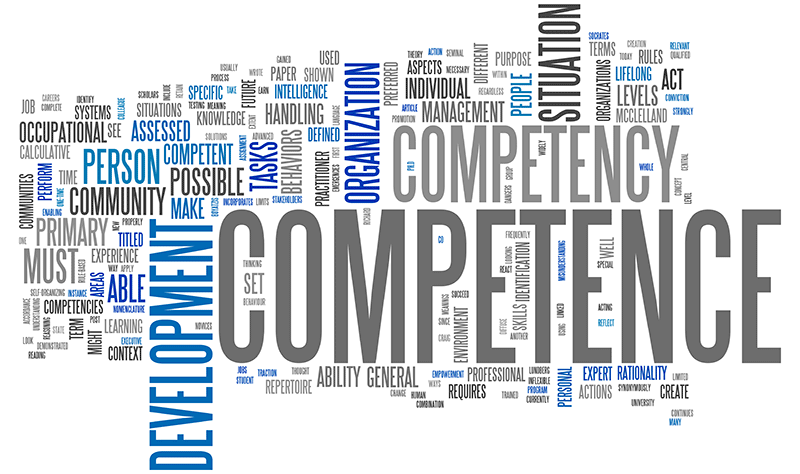Key points
- The knowledge, skills, abilities, and behaviors required for public health professionals to succeed in their roles are known as competencies.
- Learn about Core Competencies for Public Health Professionals and other discipline-specific competency frameworks used by public health organizations.

Background
In public health, successful mastery of competencies is vital to developing a strong workforce that supports organizational and community needs. Public health agencies and organizations can use competencies to:
- Create job descriptions, career paths, and quality trainings.
- Assess workforce development needs.
- Inform workforce development plans.
- Identify specific training, coaching, and mentoring opportunities or gaps.
- Determine strengths and weaknesses in organizational and individual performance evaluations.
- Support efforts to meet national accreditation standards.
- See Domain 8 of Public Health Accreditation Board Standards & Measures.
- See Domain 8 of Public Health Accreditation Board Standards & Measures.
State, local, territorial, and tribal use of competencies
Core competencies
The Core Competencies for Public Health Professionals (Core Competencies) are a framework for workforce development planning and action. They are "a consensus set of knowledge and skills for the broad practice of public health, defined by the 10 Essential Public Health Services."
The Core Competencies have a long history in supporting workforce efforts in public health practice and academic settings. They were initially developed in 1991 by the Council on Linkages Between Academia and Public Health Practice, a collaborative team of national public health practice-based and academic organizations. The current version was adopted on October 21, 2021, following a year-long review and revision process.
Examples of how public health agencies and organizations use the Core Competencies can be found on the Public Health Foundation website along with tools that can be adapted for that purpose.
Competency-Based Trainings
Competency sets are often used by training platforms to help users identify offerings that meet their needs. TRAIN is a learning management platform supported by the Public Health Foundation and used by public health agencies and organizations. CDC uses it via CDC TRAIN.
TRAIN users can use the "Competencies and Capabilities" feature to search for trainings. Users can find trainings based on specific tiers or domains of the Core Competencies and other select competencies sets.
Select public health workforce competency frameworks
Public health organizations use a variety of discipline-specific competency frameworks in addition to the Core Competencies. The list below is not exhaustive but includes many competency models that support and advance public health workforce efforts.
Core Competencies for Public Health Professionals - Council on Linkages between Academia and Public Health Practice (Council on Linkages) (Latest edition: 2021)
Competencies for Performance Improvement Professionals in Public Health (PI Competencies) - Council on Linkages (Latest edition: 2018)
Public Health Law Competency Model: Version 1.0 - CDC's Public Health Law Program (Latest edition: 2016)
Legal Epidemiology Competency Model Version 1.0 - CDC's Public Health Law Program (Latest edition: 2018)
Public Health Emergency Law Competency Model Version 1.0 - CDC's Center for Preparedness and Response and CDC's Public Health Law Program (Latest edition: 2013)
Applied Epidemiology Competencies - CDC and the Council of State and Territorial Epidemiologists (Latest edition: 2023)
Community/Public Health Nursing Competencies - The Council of Public Health Nursing Organizations (Latest edition: 2018)
Competencies for Population Health Professionals - Association for Community Health Improvement, Catholic Health Association, Council on Linkages, Association of American Medical Colleges, and Association of State and Territorial Health Officials (Latest edition: 2019)
Environmental Health Competencies - The American Public Health Association with support from CDC's National Center for Environmental Health (Latest edition: 2020)
Applied Public Health Informatics Competency Model - The Informatics Academy at the Public Health Informatics Institute (Latest edition: 2016)
Immunization Information System (IIS) Core Competency Model - Public Health Informatics Institute with support from CDC (Latest edition: 2021)
Including People with Disabilities: Public Health Workforce Competencies - A national committee comprised of disability and public health experts with support from CDC (Latest edition: 2016)
Responsibilities and Competencies for Health Education Specialists - The National Commission for Health Education Credentialing, Inc. (Latest edition: 2020)
Competency Guidelines for Public Health Laboratory Professionals - CDC and the Association of Public Health Laboratories (Latest edition: 2015)
Public Health Associate Program (PHAP) Cohort Competencies - CDC's Public Health Infrastructure Center (Latest edition: 2022)
Accreditation Criteria: Schools of Public Health & Public Health Programs – includes MPH and DrPH foundational competencies - The Council on Education for Public Health (Latest edition: 2024)
Racial Justice Competencies for Public Health Professionals - The Public Health Training Center Network in partnership with the National Network of Public Health Institutes (Latest edition: 2022)
